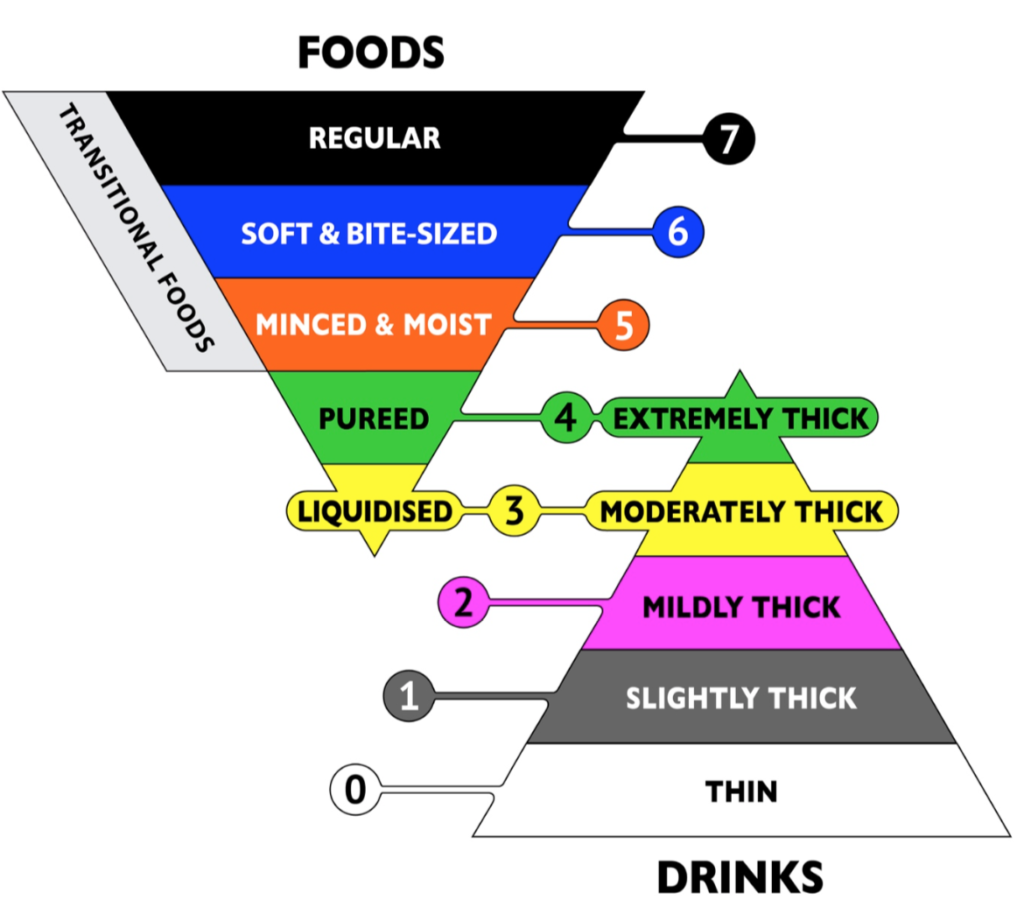About Dysphagia
Dysphagia is the medical term for swallowing difficulties. People with dysphagia typically have problems swallowing certain foods or drinks, whereas others aren’t able to swallow at all.
In the UK, the NHS state that 850,000 people suffer from dysphagia and this figure will rise to over a million by 2021.
Many health issues may cause swallowing difficulties but age increases the likelihood of a stroke, cancer, Parkinsons, or another illness causing this. Dementia is particularly associated with Dysphagia with as much as 68% of dementia patients having issues with swallowing. With an increasing population living in care homes, chefs are preparing more meals for people with dysphagia.
Preparing appetising plates of food can be challenging for chefs in the care industry, but changing the consistency of food and drinks (modifying) makes them safer for people with dysphagia to swallow. Avoiding patient safety issues with the definitions of ‘soft diets’ has required a universal method of describing diets and modified food has been developed. See the IDDSI section for more information on this.
IDDSI Framework
In the displayed IDDSI framework graphic, liquids are classified from 0-4 and food from 3-7. There is some crossover for the two at levels 3-4, where both modified food and thickened liquids have similar consistency.
Quick, easy and universal methods are available for you to test your food meets the level standard and includes syringe flow tests for liquids, fork drip tests for levels 3 and 4, spoon tilt tests for levels 4-5, and fork texture assessment tests for food particle size. Along with those, a simple test has been devised for transitional foods such as ice cream, wotsits, quavers, etc. that quickly change into another texture when saliva is applied. Download the testing method documentation here.
IDDSI have created an excellent app for the framework. This is available to download for your device on the links below.
Recipes
Preston Walker of Oakhouse Kitchen has worked with a key MKG supplier, Sosa, to develop these recipes for fortified and modified texture foods for your care needs. Feel free to experiment with them.
Wild Mushroom Pannacotta, Goat’s Cheese and Balsamic Gel
Wild Mushroom Pannacotta:
300g Double cream
100g Whole Milk
1g Pro-pannacotta
Essential Cuisine- Wild Mushroom Glace to taste
In a pan add milk, cream, glace to taste and pro-pannacotta then bring to the boil. Once boiled pour into dish to set
Chive Egg Free Mayonnaise
80g Water
20g Cider Vinegar
5g Sosa Natur Emul
30g chives
1 tablespoon mustard
225g sunflower oil
Salt and Pepper to taste
With a hand blender, blend together water, vinegar, Natur Emul, chives and mustard for 2 minutes then slowly emulsify the oil. Serve onto diced smoked salmon.
Strawberry Scone
300g Scones – cooked
500g Whole Milk
30g Sosa Instangel
50g Sosa Pro Mousse
250ml Cream
Break the scones into a pan and pour over the milk. Gently warm to infuse and soften the scones
Transfer to a blender add and process until smooth, add Sosa Instangel and Pro Mousse combine well. Whip the cream to soft peaks and fold into the scone mixture. Complete dysphagia diet texture checks and set aside for use.
Notes – can be set into rings or piped with a star nozzle.
Perfect Purees
Strawberry Gel
400g Strawberry Puree
100g stock syrup
32g Gel Crem Cold
Using hand blender, blend until thickens, leave for 30 minutes to hydrate then blend again to get finished product.
Protein Smoothie
25g Sosa Sojawhip
250g Strawberry Puree
150g Banana
30g Beetroot Powder
200g Greek Yoghurt
50g Raspberry Puree
50g Whole Milk
Honey to taste
Blend all ingredients in Thermomix until a smooth texture is achieved
Can add more milk for a thinner consistency
(46.5g Protein total this recipe)
Servings- 3 x 250g = 15.5g Protein per serving
Aroma’s
There are nearly 200 different aromas available in the Sosa range which can be infused into an environment or added to recipes to enhance flavour; helping people to want to eat and also stimulating the senses to invoke memories from the past. The aromas are completely natural.
Dementia and dysphagia residents will love a non-alcoholic ‘mocktail’ with the great smell and taste of a refrshing G&T or a brandy and coke.
Gin and Tonic Mocktails:
Tonic
Sosa Gin Aroma
Cucumber garnish
Please note: Recipes are provided as a guide and should be prepared alongside national guidelines and individual advice from a speech and language therapist. Dietary checks must be carried out before serving.
Recommended Foods
MKG provides a vast range of recommended products for modifying and changing the consistency of your dishes. For more information, contact the team at 0330 058 8888.



